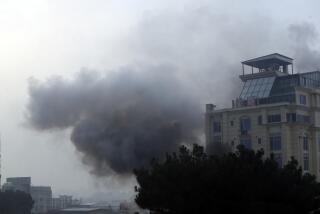500-Pound Bomb Used on Hotel
- Share via
BAGHDAD — As civic and religious leaders debated whether Iraq was stable enough for elections this spring, U.S. military officials said that a 500-pound bomb -- hidden inside a truck disguised as a Red Crescent ambulance -- was used in a deadly suicide attack early Wednesday at a Baghdad hotel.
The blast at the Shaheen Hotel -- frequented by Iraqi government officials and Westerners -- killed at least three people, U.S. officials said.
Iraqi police on the scene said four people were killed. Local hospitals reported more than a dozen injuries.
South African government officials said Wednesday that one of their citizens was among the dead.
The bomb cast a pall over a previously scheduled town hall-style meeting sponsored by the U.S.-led Coalition Provisional Authority to promote and explain its Nov. 15 agreement to turn over sovereignty to a new government this summer.
About 200 Iraqi political leaders, academics and clerics attended the forum, including Adnan Pachachi, current president of the U.S.-appointed Iraqi Governing Council. Similar meetings are being held across the country to encourage Iraq’s transition to a democratic society.
“Terrorists must stop targeting innocent civilians,” Governing Council spokesman Hamid Kifai said during the event. “They cannot intimidate the Iraqis.”
As has frequently happened in terrorist attacks here, the hotel blast took the heaviest toll on Iraqi civilians.
Abdul Karim was driving past the Shaheen Hotel when he felt an explosion and was thrown from his GMC sport-utility vehicle.
“God saved me,” he said from his hospital bed, recovering from a shrapnel wound to his neck.
A moment later, Karim, who ferries workers to and from a nearby electricity plant, broke down in tears, reflecting on his destroyed car.
“What am I going to do now?” he asked. “I made my living from that car. What am I going to do?”
Outside Ibn Nafees Hospital in Baghdad, half a dozen women dressed in black veils sobbed quietly as a wounded Iraqi guard -- his face badly swollen, and bandaged -- was transferred to another facility for treatment.
“My nephew. What has happened?” cried one woman, holding the bloodied shirt of his uniform.
Residents of the riverfront neighborhood spent Wednesday sweeping up glass and shaking out carpets after the blast shattered windows several blocks away.
“See my house,” said Fawzie Nabood, 78, who lives down the street from the hotel. “See what they have done.”
As investigators combed the area for clues, coalition officials forged ahead with the much-touted town hall session in Baghdad in which they encouraged an audience of Iraqi leaders -- handpicked by the coalition authority and the Governing Council -- to debate such democratic issues as federalism and women’s rights.
The meeting was closed to the public, in part for security reasons, officials said.
The U.S. is eager to build support for its plan to transfer authority by June 30 to a new Iraqi assembly selected through a series of caucuses nationwide. It says Iraq is not ready for direct elections. But leading Shiite Muslim cleric Grand Ayatollah Ali Sistani wants Iraqis to vote for who will represent them in the new legislature.
The United Nations this week agreed to send a team to Iraq to evaluate the feasibility of elections before the June deadline.
“If elections are not possible at this stage, we will have to discuss some alternatives,” Pachachi said.
Raheem Salman of The Times’ Baghdad Bureau contributed to this report.
More to Read
Sign up for Essential California
The most important California stories and recommendations in your inbox every morning.
You may occasionally receive promotional content from the Los Angeles Times.












